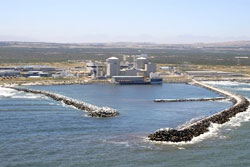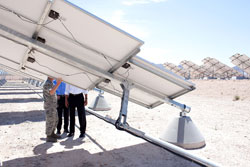SA's long-term nuclear plan no solution to country's short-term energy needs
According to Vice President of Talesun Energy, Arthur Chien, the recent signing of a nuclear power cooperation deal between South Africa and Russia, which has been touted by many as a potential energy solution, is not a solution as this is a long-term strategy for the country. He says it is crucial that renewable energy projects are fast-tracked nationally, in order to counter electricity shortages in the short-term.

Chien explains that the construction of a nuclear station can take anywhere from five to seven years, whereas a wind farm takes about six months and a solar farm would take only 16 weeks from start to finish depending on its size.
"South Africa's electricity crisis was recently highlighted at the Medium Term Budget Policy Statement in October 2014 as being one of the main factors hindering growth and investments in the country and is largely the driver behind the recent signing of the nuclear power cooperation deal between South Africa and Russia to build up to eight nuclear reactors."
Talking millions and billions
However, he says that nuclear power is not economically viable due to high costs needed to construct and maintain plants. "The cost to build a nuclear power station varies in each country. In the United States for example, a nuclear reactor could cost around $10 billion and repairs can also amount to millions of dollars. At the Palo Verde Nuclear Generating Station in Arizona in the US, last year, a leak inside the reactor cost $10 million to $15 million to repair. Solar farms on the other hand, are far more economical as the cost to build ranges between $300 million and $500 million and all that is needed is a large piece of land which receives a vast amount [of] sunlight."
Furthermore, Chien says that the running costs of electricity generated by a nuclear power plant are far higher than electricity generated from photovoltaic solar energy, as nuclear power plants run throughout the day and night, and according to the Brookings Institution, an American research NGO, they are 75% more expensive to build and run per MW of capacity than a solar-power plant.
Therefore continuing to operate nuclear plants prevents the large-scale integration of renewable energy into the electricity grid." Chien refers to research conducted by Greenpeace, which states that nuclear also channels investment away from renewables where investment can make a difference in fighting climate change and that renewables can replace several times more of the carbon that is leading to climate change - for the same cost as nuclear and at a far faster pace.
Health and environmental risks
Chien adds that the health and environmental risks associated with nuclear power are also extremely high, especially for those who work in and live in close proximity to plants. "Nuclear power produces toxic waste which can be detrimental to people's health, as well as the environment. Furthermore, the risk of a nuclear accident like that of the Fukushima meltdown exists and it is crucial to consider because of the effects, including increased levels of radiation in the area and contaminated food and water."

In addition, he points to the issue of nuclear waste, which is created from the use or reprocessing of nuclear fuel. "This is difficult to dispose of and special remote areas have to be located and designated in order to dump the waste, whereas solar panels can be recycled. The cost to recycle solar panels is often included in the overall cost of the installation of solar panels, but this is not always the case when it comes to the disposal of nuclear waste." Further, he says that as nuclear waste is able to remain radioactive for either a few hours or thousands of years. Chien says that there's no wonder why countries such as Sweden, Italy, Belgium and Germany have started to phase nuclear power stations out, and countries such as Austria and Spain have enacted laws to cease construction on new nuclear power stations.
"The recent 2014 World Nuclear Industry Status Report notes that the use of renewable energy will increase rapidly and that investment in renewable energy will prevail and will ultimately surpass investment in fossil fuel power stations and nuclear power plants.
"An indication that South Africa is heading in the right direction to overcome the energy crisis by means of an environmentally friendly, safer and more economical way, includes the rollout of Kalkbult solar plant in the Northern Cape, a Renewable Energy Independent Power Producer Procurement Programme project, which can already produce enough electricity to be consumed by approximately 33 000 households, lessening the carbon footprint in the area,"
About Talesun Energy
Talesun Energy, a subsidiary of global solar solutions company Zhongli Talesun Solar, consistently produces industry-leading quality, crystalline photovoltaic modules manufactured in the world's largest, fully automated production facility. This systematic production process provides Talesun customers with front-runner price-performance ratios. Zhongli Talesun Solar is a subsidiary of Zhongli Sci-Tech Group Co, Ltd, an international market leader in special cables, optical fibre cables and photovoltaic product manufacturing. For more information please visit www.talesunenergy.com.